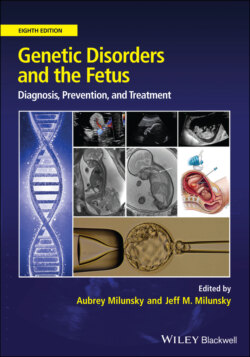Читать книгу Genetic Disorders and the Fetus - Группа авторов - Страница 14
The burden of genetic disorders and congenital malformations
ОглавлениеA conservative estimate for the world population prevalence of rare diseases (71.9–80 percent considered as genetic) is 3.5–5.9 percent, equating to 263–446 million individuals affected at any point in time.3, 4 In India, which has a quarter of the world's neonatal deaths (an estimated 753,000 in 2013), about 9 percent were due to congenital anomalies.5 An estimated 7.9 million infants worldwide are born each year with a major congenital malformation according to a report in 2013.6 The likelihood of having a child with a congenital malformation varies from 2 to 10 percent7 due to multiple factors that complicate efforts to accurately diagnose and determine the incidence or prevalence of congenital anomalies or genetic disorders. Box 1.1 lists the majority of known etiologic categories, discussed below, which help explain sometimes striking differences among major studies. It is almost impossible to account for all these potentially confounding factors in a study, and rarely has any one study come close. Of the >7,000 rare genetic disorders, about 1 in 12 to 1 in 16 individuals are affected,1 aware or unaware. Given a world population of 7.6 billion, an estimated 473 million are likely to have a rare disease.1 More than 4,331 genes with phenotype‐causing mutations have been identified, including 6,739 phenotypes with a known molecular basis.2 Severe intellectual disability is considered to be largely genetic in origin8, 9 with a global prevalence between 0.5 and 1.0 percent.10 Despite continuing progress in the discovery of genes causally related to neurodevelopmental delay,11 in less than 40 percent of cases is there a definitive recognition of cause. The European Organization for Rare Diseases maintained that about 30 percent of all patients with a rare disease died before the age of 5 years.12 In the United States in 2013–2014, congenital malformations, deformations, and chromosomal abnormalities accounted for the most infant deaths – 4,746 (20.4 percent) out of 23,215 – in any category of causation.13
